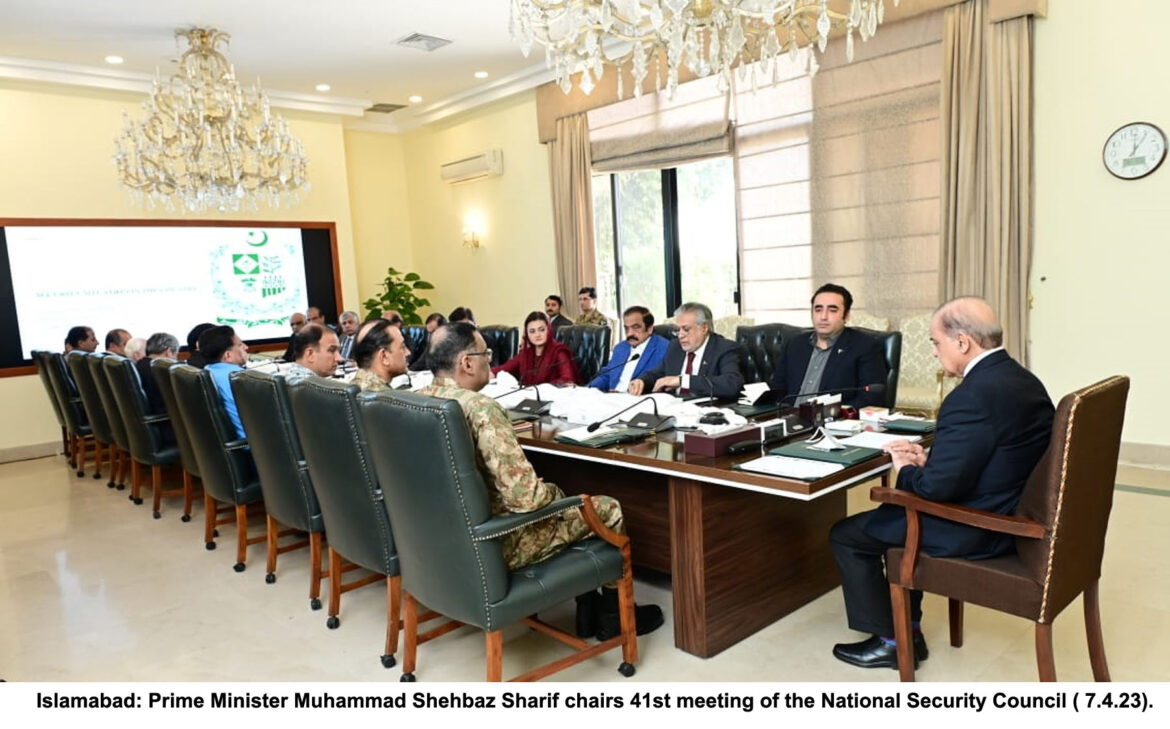By Naveed Naqvi
ISLAMABAD: The nation’s highest security body has agreed to launch a “comprehensive operation” aimed at eradicating terrorism from the country, though the upcoming military operation against Islamic militants may potentially disrupt preparations for the upcoming Punjab elections scheduled for May 14th.
The National Security Committee (NSC), at its 41st meeting, decided to re-launch the National Action Plan (NAP) within 15 days to crush the resurgence of terrorism in tribal districts along the border with Afghanistan.
The NSC meeting was chaired by Prime Minister Shehbaz Sharif and attended by senior civil and military leadership, including Foreign Minister Bilawal Bhutto Zardari, Interior Minister Rana Sanaullah, Information Minister Marriyum Aurangzeb, Finance Minister Ishaq Dar, Chief of Army Staff Gen Asim Munir, Chairman Joint Chiefs of Staff Committee Gen Sahir Shamshad Mirza, services chiefs and chief ministers.
The NSC session was held at the Prime Minister’s House and initially lasted for two hours before being resumed and concluded in the evening.
A statement issued from the Prime Minister’s Office said a high-level committee has been formed to submit recommendations regarding the implementation and limitations of the operation within two weeks.
They also agreed to initiate new multi-pronged and comprehensive operations, as well as combined efforts on the diplomatic, security, economic and social fronts for the elimination of terrorism in all its forms and manifestations.
“The meeting agreed to launch an all-out comprehensive operation with [the participation of] the entire nation and government to rid the country of the menace of terrorism with renewed vigour and determination,” the statement said.
Security analysts said the NSC’s recent decision to launch a large-scale operation may further decrease the likelihood of holding elections in Punjab.
This comes just two days after the government had firmly declined to comply with a court order regarding the May 14th polls.
During the NSC meeting, participants emphasized the need for “comprehensive national security” with a focus on relief for the people. They were informed that the government was taking necessary steps in this regard.
The NSC concluded that the recent spate of terrorism in the country was a consequence of a “soft corner” for the banned militant group Tehreek-i-Taliban Pakistan and a “thoughtless policy” towards the terror outfit, both of which were “contrary to the public’s expectations”.
As a result, the statement said, “terrorists were not just allowed to return to the country unimpeded but dangerous TTP militants were also released from jails in the name of confidence building”.
“With the return of these “dangerous terrorists” and as a consequence of assistance being provided from various militant organisations operating in Afghanistan in large numbers, the country’s peace and stability were destroyed.”
It underlined that this peace and stability were attained after “countless sacrifices and continuous efforts”.
The NSC expressed the determination to defeat the “nefarious designs” of the country’s enemies and resolved that all possible efforts would be made to maintain the “peace and order achieved by the great sacrifices and continuous efforts of the martyrs”.
The participants of the meeting paid tribute to the martyrs of the Gayari sector tragedy on April 7, 2012, when at least 140 people, including Pakistan Army personnel and civilians, were martyred after an avalanche struck an army camp near the Siachen glacier.
The NSC also lauded the arrest of the founder of the banned militant group Baloch National Army, Gulzar Imam alias Shambay, as announced by the military’s media wing earlier in the day.
The committee strongly condemned the efforts to spread foreign-sponsored poisonous propaganda against state institutions and their leadership on social media under the guise of ulterior motives, as well as growing divisions and hatred in society, determining that this affects national security.
“The committee strongly condemned the efforts to spread foreign-sponsored poisonous propaganda against state institutions and their leadership on social media under the guise of ulterior motives, as well as growing divisions and hatred in society, determining that this affects national security,” the statement said.
Copyright © 2021 Independent Pakistan | All rights reserved




